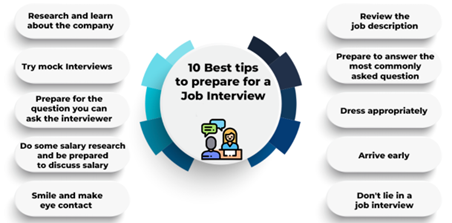- Introduction
- Section 1: How to find and apply to a job position
- Section 2: How to create a complete and understandable personal curriculum
- Section 3: Making available and demonstrate the right competencies for the requirements of a job position
- Section 4: Presenting and discussing effectively the personal curriculum during a selection process
- Concluding remarks
- Quiz
Tailoring to job requirements
A key aspect of writing an effective CV and covering letter is tailoring it to the specific requirements of the job you are applying for. Working on a standard application without taking into account the specific requirements of the employer can be counterproductive and reduce your chances of being selected for an interview.
It is therefore important to read the job description carefully and identify the key skills and requirements. This means not only looking at past experience and qualifications, but also assessing the soft skills, problem-solving skills, teamwork skills and more that the employer may require.
Once the key requirements have been identified, it is important to highlight relevant experience and achievements that demonstrate these skills. For example, if the job requires leadership skills, it is important to talk about past experiences where you have led a team or successfully coordinated a project. If the job requires specific skills in the field, it is important to highlight the experiences that demonstrate you have acquired these skills.
In addition, if there are gaps in skills or experience compared to the requirements of the job, these can be addressed through additional training or experience. For example, if there is a lack of specific language skills required for the job, efforts can be made to improve these skills through language courses or study abroad experiences.
Another important tip is to avoid including excessive information that is not relevant to the specific application. There is sometimes a tendency to fill the CV with experience and qualifications that may not be relevant to the employer. It is important to focus on the experience and skills that are most relevant to the job requirements and that can demonstrate your value as a candidate.
The European format is not recommended except when explicitly requested. This is because the proposed schematization does not allow one to highlight the skills one possesses. The Europass has a more simple and straightforward ‘grid’ structure. It is a pre-filled and rather repetitive format, which considerably lengthens the required two to three pages, discouraging the enhancement of one’s skills. The European CV can be very uncomfortable for those who have accumulated a lot of professional and educational experience, since its structure is long.
For this reason, a compiled format such as the European CV is not advisable unless expressly requested: it is better to have a personalised, graphically original CV, always with a clear and professional photo that can present the candidate positively. To fill in the European CV, you can download the template directly from the official Europass website.
In summary, tailoring your CV and covering letter to the specific requirements of the job is crucial to increasing your chances of being selected for an interview. This means reading the job description carefully, identifying the key requirements and highlighting relevant experience and achievements. It is also important to fill in any gaps in your skills and experience and to avoid including irrelevant information. By following these tips, you will be able to present yourself as the ideal candidate for the job you want.
Proofreading and editing the CV and covering letter is crucial to presenting yourself in the best possible light to potential employers. Mistakes in spelling, grammar and punctuation can give a negative impression of your professionalism and attention to detail, which can have a negative impact on your profile rating. To avoid annoying and potentially damaging mistakes, it is important to take the time to carefully correct and edit your documents. A common practice is to read your CV and covering letter aloud to spot any mistakes and improve the flow of the text.
You can also rely on online spell-check tools to highlight common mistakes and suggest corrections. However, it is important to remember that these tools are not infallible and human proofreading is always recommended. Seeking feedback from trusted people, such as friends, family or colleagues, can be extremely helpful in identifying errors and improving the consistency and clarity of documents. The opinion of someone who knows your field well can be particularly valuable in ensuring that you submit an effective CV and cover letter. It is important to ensure consistency of tone and style in documents when proofreading and editing. Ensure that you maintain a clear and concise narrative and adhere to the standards of professionalism required in your industry. Avoid expressions that are too informal or superfluous and ensure that the content is well structured and easy to understand.
Remember that your presentation should convey confidence and competence to the employer. An accurate and well-edited CV and covering letter can make all the difference in the selection process. Make sure you put your best effort into your documents and present yourself in the best possible way to increase your chances of success in the world of work.
Stages of an interview process
There are different stages of the interview process and give practical advice on how best to manage them.

The first stage of an interview process is preparation. Before meeting the employer, it is important to take time to study the company and the position you are applying for. It is useful to look for information about the company’s history, the products or services it offers, and its values and culture. It is also important to have a good understanding of the responsibilities and skills required for the position in question.
During the preparation phase, it is also a good idea to practise answering typical interview questions. For example, you can prepare answers to questions about your previous work experience, why you want to work for the company and your personal qualities. It is also useful to practise communicating clearly and concisely, avoiding rambling or being too long in your answers. Once you have prepared, it is also important to take care of your appearance. It is advisable to dress appropriately for the business context and to take care of your appearance in general. Well-groomed and professional clothing can make a good impression on the employer and demonstrate your interest in the job.
During the interview, it is important to be genuine and sincere. It is important to be confident and answer questions clearly and convincingly. It is also useful to ask the employer questions to show interest and curiosity about the company and the job. This will show that you are motivated and interested in working together.
Finally, it is important to be prepared for difficult questions or unforeseen situations during the interview. For example, you may be asked to solve a practical case or demonstrate your critical thinking skills. In these cases, it is useful to remain calm and approach the situation with determination and patience.
In conclusion, the interview process is a crucial step in selecting candidates for a particular job. It is important to prepare well, be authentic and give clear and convincing answers to the employer’s questions. By following these tips, you can increase your chances of success and get the job you want.
